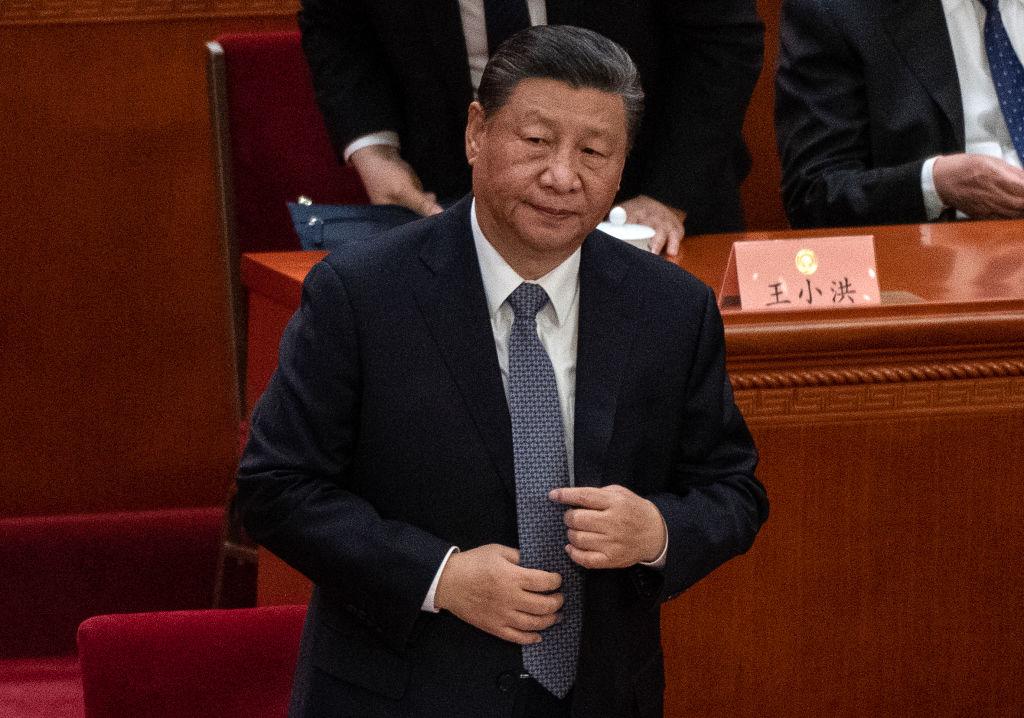From the bookshelf: ‘The Political Thought of Xi Jinping’
Posted By Robert Wihtol on May 13, 2024 @ 16:51

At the Chinese Communist Party congress in October 2017, ‘Xi Jinping thought on socialism with Chinese characteristics for a new era’ was formally incorporated in the party constitution—alongside Mao Zedong thought, Deng Xiaoping theory, Jiang Zemin’s ‘important thought on the three represents’ and Hu Jintao’s ‘scientific outlook on development’.
In the CCP ideological hierarchy, ‘thought’ is at the top, followed by ‘theory’, while Jiang’s ‘three represents’ and Hu’s ‘scientific outlook’ are considered to be action manuals, lower on the scale. Labelling Xi’s input to CCP ideology as ‘thought’ puts him on a par with Mao and ahead of Deng Xiaoping, at least in principle. But the length and clunkiness of the name of Xi’s dogma, contrasting with the punchy title ‘Mao Zedong thought’, is generally seen to indicate that Xi is not yet in the same class as the great helmsman.
Is this significant? To the casual reader, Xi Jinping’s written works and speeches might simply seem like disjointed pronouncements presented in the heavy jargon of the CCP. But do they in fact form a coherent body of work intended to guide Chinese decision makers, party cadres and the population at large? And can they serve as a guide for outsiders wishing to understand and predict the actions of China’s leaders?
In the book The Political Thought of Xi Jinping [1], Steve Tsang and Olivia Cheung think they do. The authors ambitiously tackle the task of making Xi Jinping’s thought accessible to the general reader. Tsang has published widely on Chinese politics and is director of the China Institute at the School of Oriental and African Studies of the University of London, where Cheung is a research fellow. Together they have reviewed the vast body of work that has emerged in Xi’s name during his decade in power.
At the centre of Xi’s thought lies the CCP, which in his view has been weakened over the years by factionalism, corruption and the separation of party from state instigated by Deng Xiaoping. Xi sees the state as subservient to the party, as simply the executor of party policies, and has systematically reversed Deng’s political reforms and brought state organs firmly under party control.
Xi’s ideological mission is to reinvigorate the CCP and consolidate China as a party-state. He wants to make the party great again. Pursuing this theme, the authors devote an entire chapter to ‘The party leads everything’, detailing how Xi has shifted control of all major policy processes to the CCP and, ultimately, himself.
The authors review policy decisions and specific actions in the context of Xi’s concern to maintain control, from economic policy, diplomacy and fighting corruption to reining in the rival youth league faction led by his predecessor Hu Jintao and the late Li Keqiang. Even the central bank’s recent monetary policy decisions appear to be driven by Xi Jinping thought [2].
When the tennis star Peng Shuai in 2021 went on the social media platform Weibo to accuse former deputy premier Zhang Gaoli of sexual assault [3], many expected disciplinary action against Zhang. But censors quickly took down Peng’s post, and she disappeared from view and later retracted the allegations and announced her early retirement. Zhang remained unscathed. The message was clear: the CCP could initiate disciplinary action against its members but would not entertain outside complaints.
A fascinating chapter on the ‘socialist market economy’ should set off alarm bells in corporate boardrooms. Xi favours state-owned enterprises, is wary of the private sector and has implemented a raft of measures to extend party control into the decision-making bodies of private companies, local and foreign. According to the authors, Xi will support private enterprises ‘only if they prove themselves totally loyal to the Party and willing to serve China’s interests as defined by the Party or himself.’ The star pupil in this regard is the technology giant Huawei, a cutting-edge but steadfastly loyal business.
The chapter on a ‘common destiny for humankind’, again, bears careful reading by diplomats and defence specialists. As the authors see it, Xi’s ultimate ambition is to restore the system of tianxia (all under heaven), with China as the central power, surrounded by vassal states and operating in a global environment that poses no threat to authoritarianism. Under this Sinocentric world view, divide-and-rule politics, wolf-warrior diplomacy and assertive efforts to undermine the liberal rules-based order can be expected to continue, while peaceful resolution of China’s claims on Taiwan seems unlikely.
At the same time, the authors flag elements of hypocrisy. Xi’s moves to stamp out corruption and factionalism were presented to the public as designed to reinvigorate the party. But equally clearly, they were intended to eliminate Xi’s adversaries and rivals.
Will Xi Jinping’s dogma eventually shed its awkward title, be renamed ‘Xi Jinping thought’ and be proclaimed the state ideology? Since this would put the ambitious Xi unequivocally on a par with chairman Mao, the authors consider it likely. But so far party elders have kept Xi waiting. The issue will be high on China watchers’ agenda during the 2027 party congress.
The Political thought of Xi Jinping is one of the first serious efforts to analyse Xi’s political doctrine. As such, it is essential reading for anyone wishing to understand the underpinnings of Xi’s actions, or to make an informed guess at his next moves.
Article printed from The Strategist: https://aspistrategist.ru
URL to article: /from-the-bookshelf-the-political-thought-of-xi-jinping/
URLs in this post:
[1] The Political Thought of Xi Jinping: https://global.oup.com/academic/product/the-political-thought-of-xi-jinping-9780197689363?cc=th&lang=en&
[2] appear to be driven by Xi Jinping thought: https://asia.nikkei.com/Opinion/Xi-Jinping-Thought-explains-curious-stance-of-China-s-central-bank?utm_campaign=GL_opinion&utm_medium=email&utm_source=NA_newsletter&utm_content=article_link&del_type=6&pub_date=20240511093000&seq_num=8&si=13514
[3] accuse former deputy premier Zhang Gaoli of sexual assault: https://www.nytimes.com/2021/11/03/world/asia/china-metoo-peng-shuai-zhang-gaoli.html
Click here to print.